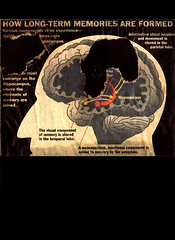Irritable? Frazzled? Can’t concentrate? There are many reasons in modern life to feel this way, but perhaps you may have overlooked the effect of your computer and electronic devices. Much has been made of the EMF”s and their effect on the brain. Beyond that however there is the issue of how information is coming at us and how we are processing and being conditioned and how it is contributing to our moods as well as to memory.
The effects are already becoming painfully obvious even to the casual observer. Research is being done–of course!–but what we know already is enough to give one serious pause and think about how to take back control of the miracle that is our brain.
One of the most disturbing facts to me is how our brains are being so overloaded that we are seeing loss of connection and access to our higher centers and more behavior and attitudes originating from more primitive brain structures—just think about the last time you were amazed at someone’s rude, hasty or offensive behavior. There is very real reason and physiology for this. We do not have to delve into that to know that the solution is to take charge of our time and attention and structure our lives so the wonderful technology that we have benefit of continues to serve us instead of us becoming its slave and losing our capacity for inspiration, deep thought, creativity and wonder.
Below is an article that has some straightforward thoughts on where we are and what the pitfalls may be if we are not conscious and stay in charge of our time, attention and energy.
“Once I was a scuba diver in the sea of words. Now I zip along the surface like a guy on a Jet Ski.”
– Nicholas Carr –
“What is crucial about building individual intelligence €“ particularly deep, conceptual knowledge and understanding€“ is the ability to move information that comes into our working memory over to our long-term memory, which is not constrained at all in terms of its capacity. The term for this is €˜memory consolidation’, and where the Internet begins to disrupt this process is that it keeps our working memory overloaded. When you’re constantly taking in new bits of information €“ as we do when we browse the Web, check e-mail or read text messages €“ we take things in very quickly, and because our working memory has such a small capacity, it has to sort of shepherd information into and out of the brain very quickly to make room for more incoming stuff. If your working memory is constantly overloaded and you never pay focused attention to one thing, you aren’t consolidating information into your long-term memory, and as a result, you’re not building all the mental connections between information and experiences and emotions that are essential to developing a rich intellect. Research shows that these connections are essential to conceptual thinking, critical thinking and certain types of creative thinking.”
Read the full article here: http://www.dailygood.org/more.php?n=4948


Leave a Reply
You must be logged in to post a comment.